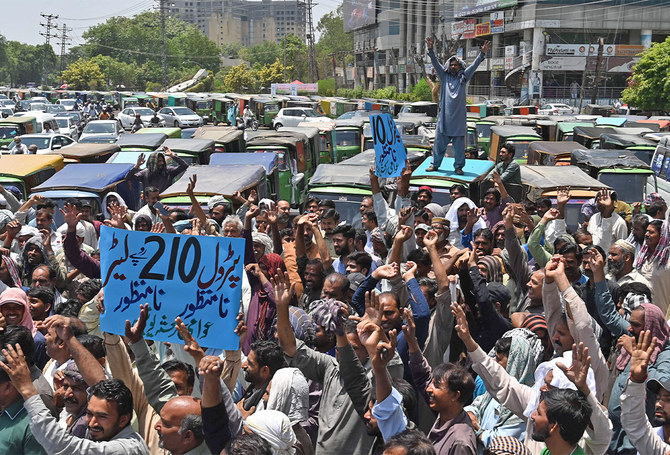KARACHI: Pakistan is bracing for an ‘inflationary storm’ after the government raised fuel and electricity prices this week to secure International Monetary Fund (IMF) bailout money, with industrialists warning the move would dent the viability of industries and lead to mass closures.
Pakistan entered a three-year IMF deal in 2019, but is struggling to implement tough policy commitments to revive the $6 billion program desperately needed to stabilize the cash-strapped South Asian nation.
A pending tranche of over $900 million is contingent on a successful IMF review, and would also unlock other multilateral and bilateral funding for Pakistan, whose foreign reserves currently cover just two months of imports.
After the IMF pushed Islamabad to roll back its subsidies for the oil and power sectors during talks in Doha last week, the finance ministry raised fuel prices by around 20 percent, and within a week by another 17 percent, effective from Friday, today.
The fuel hikes have come along with an increase in the basic power tariff by 47 percent, rattling Pakistani industrialists who say they will be forced to close down their units.
“No one can think about setting up industries after the steps being taken by the government because it would render the business unviable and industries will be eliminated in large numbers,” Muhammad Idreed, president of the Karachi Chamber of Commerce and Industry (KCCI), told Arab News.
“The outcome of the tariff and fuel price hike would be detrimental for the industries as it would increase unemployment, lead to a drastic cut in exports and increase inflation in the country as cost of almost all inputs has more than doubled.”
Industrialists have called for remedial measures, including rate cuts, to offset the new price hikes and save the industry, especially small and medium enterprises.
“The sharp rise in prices of petroleum products, excessive power tariff and severe energy crisis are catastrophic for business and industry,” Saqib Naseem, the chairman of the Pakistan Yarn Merchants Association (PYMA), said in a statement.
With the new price hikes, Pakistan’s inflation rate is expected to soar to 19 percent this month — its highest in over a decade.
“The direct impact of the fuel and power tariff hike would be on the Consumer Price Index (CPI), which will add 1.5 percent and 2 percent to the prevailing inflation rate,” Tahir Abbas, head of research at Arif Habib Limited, told Arab News.
“The combined inflationary impact of the fuel and electricity tariff, if the determined tariff is implemented, would be around 19 percent in June 2022. There would be a second round impact, when the price hike of goods and services after the cost of input is increased.”
Economists say the price hike would open the “floodgates” of inflation and hit the country’s poor.
“The inflationary storm is going to destroy the purchasing power of ordinary households in the coming days and months,” Uzair Younus, director of the Pakistan Initiative at the Washington-based Atlantic Council, told Arab News. “To mitigate suffering and protect the most vulnerable, the government should redirect resources to direct cash transfers. They have already announced such a measure but the quantum of funding must be increased.”
Adil Jilani, head of the Economic Division at Trust Securities & Brokerage, told Arab News even harsher measures were expected in the future as Pakistan would be asked by the IMF to “do more” to meet pre-conditions and arrange external financing requirements for next year.
“The government has increased petroleum prices to an unprecedented level and now the government needs to ‘do more’ for the IMF bailout package along with external financing requirements of $37-38 billion that the country needs during the next fiscal year FY23,” Jilani said.
Younus added: “There is still about a Rs9 subsidy on petrol and about Rs23 subsidy on diesel. In addition, the government has to place a 17 percent sales tax and a Rs30 levy, as agreed to with the IMF months ago.
“Assuming oil price stays the same and rupee doesn’t weaken further, we are looking at petrol touching about 285 rupees a liter,” he said.
Pakistan’s equity market has already reacted to the latest developments, which also include international credit agency Moody’s downgrading Pakistan’s outlook from stable to negative over a “heightened external vulnerability risk” and the inability to secure additional external financing.
The benchmark KSE 100 index declined by 923 points, or 2.2 percent, to close at 41,314.88 points on Friday.
“Stocks fell across the board after Moody’s cut Pakistan outlook to negative on fiscal risks amid delays in IMF bailout and concerns over global equity selloff,” Ahsan Mehanti, chief executive of Arif Habib Corporation, told Arab News.
“Dismal data of $43.33 billion trade deficit for July 2021 to May 2022, falling forex reserves and surging government treasury bond yields, and saving rate hike played a catalyst role in bearish close.”
















